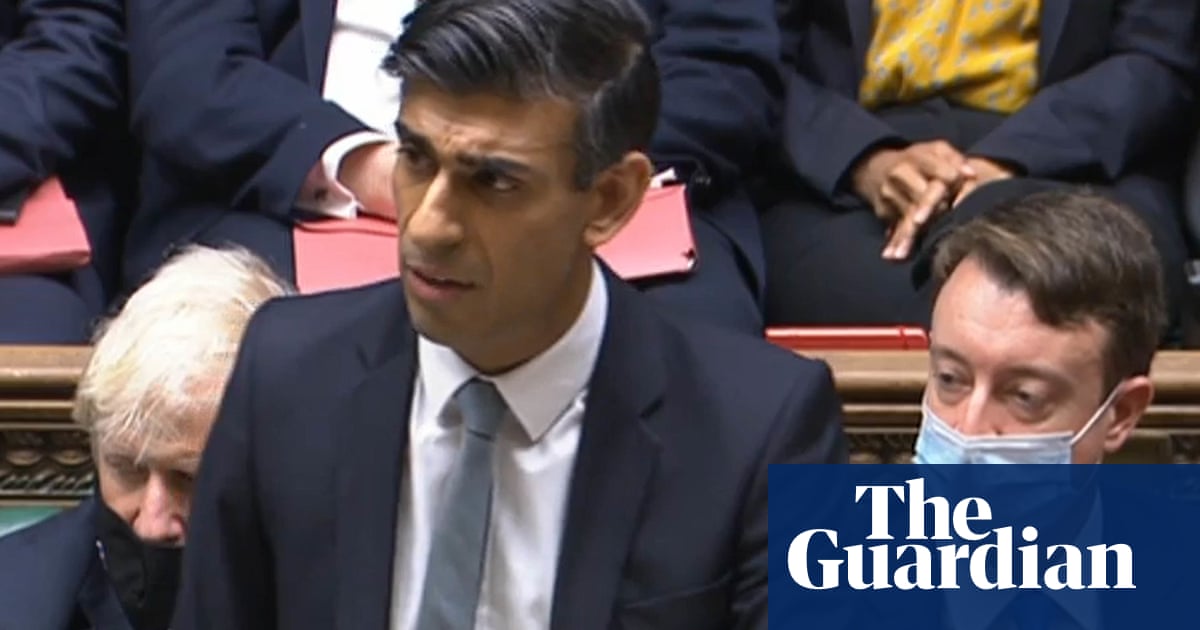Budget 2021 Sunak softens universal credit cuts to tackle squeeze on families

Rishi Sunak has bowed to intense pressure by partly reversing universal credit cuts as he announced measures in the budget to deal with a squeeze on households this winter, with lower alcohol and fuel duties.
In a budget statement aiming to move on from the coronavirus pandemic, the chancellor said he would introduce reforms to universal credit worth more than £2bn, to soften the blow from the biggest ever overnight cut in benefits.
Earlier this month the government scrapped the £20-a-week uplift in universal credit, which was part of the government’s emergency Covid support package. Ending the temporary uplift, amounting to £6bn a year, slashed the incomes of 6 million claimants by £1,040 a year, heaping more pressure on households faced with a rise in the cost of living.
Announcing the change to reduce the impact, Sunak said the taper rate in universal credit would be adjusted so that the amount of benefit a worker will lose for every pound they earn above their worker allowance will be reduced to 55p in the pound from 63p currently. To help struggling families who need help now, the change will come into effect no later than 1 December, Sunak said. However, people on universal credit who are not working will not benefit from the policy.
The move comes as the chancellor â€" who announced that Whitehall spending in this parliament will rise by £150bn â€" benefits from an improved growth outlook after a faster economic recovery earlier this year from the pandemic despite mounting pressure on businesses and households from rising inflationary pressures. The UK economy is now forecast to grow by 6.5% this year compared with 4% at the time of the March budget.
Sunak began his budget on a note so distinctly Johnsonian that it could have been written by the prime minister.
He called it, pointedly, “the prime minister’s economy of higher wages, higher skills, and rising productivity. Of strong public services, vibrant communities and safer streets. An economy fit for a new age of optimism.†It was a diplomatic opening, at a time when relations between No 10 and No 11 have been difficult.
He heralded the beginning of a “new economy post Covid†â€" although the very present nature of the pandemic was embodied in Rachel Reeves, the shadow chancellor, who was sitting in for Keir Starmer, who had tested positive for the virus.
But the conclusion, with the announcement of the taper rate cut, was pure Sunak â€" and a signal to the Tory backbench, which had been muted throughout some of the higher spending commitments.
In a hint of further tax cuts to come before the next election, Sunak said he was deeply concerned with the size of the state and of the tax burden. “Do we want to live in a country where the response to every question is: ‘What is the government going to do about it?’ … Where every time prices rise, every time a company gets in trouble, every time some new challenge emerges, the answer is always: the taxpayer must pay?
“Or do we choose to recognise that government has limits. That government should have limits.â€
Giving his statement to a packed House of Commons, he said he would launch the most radical changes to alcohol duty for 140 years with a new tax system â€" an unexpected move designed to tackle rising living costs for households.
The measures, which will cut the UK’s main duty rates on alcohol from 15 to six, will lower taxes on low-strength wines, such as rosé and prosecco, beers and ciders, and push up the cost of high-strength beverages.
In a move benefiting pubs and bars, with Sunak saying he wanted to support responsible drinking, the chancellor cut duty rates on draught beer and cider by 5%, taking 3p off a pint, marking the biggest cut for 50 years and saving consumers £3bn over the next five years.
Sign up to the daily Business Today email or follow Guardian Business on Twitter at @BusinessDeskAgainst a backdrop of record high petrol prices hitting households amid severe disruption to the global economy after lockdown, fuel duty will also be frozen for the 12th consecutive year, saving the average motorist £1,900.
The measures aimed at tackling the cost of living come as rising inflation bites into the spending power of households, although they will also be viewed as the government prepares to host the Glasgow Cop26 climate summit within days and as cases of coronavirus remain high.
“The budgets are set, the plans are in place, the task is clear, now we must deliver. This isn’t the government’s money, it’s taxpayers’ money,†Sunak said.
The Labour benches were often in louder voice than the Tories, although backbenchers cheered loudly for the alcohol duty changes and the taper rate.
0 Response to "Budget 2021 Sunak softens universal credit cuts to tackle squeeze on families"
Post a Comment